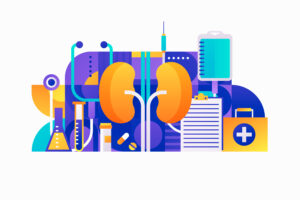As we grow older, our bodies naturally undergo various changes, and our kidney health is no exception. Over time, the kidneys may experience a gradual decline in their ability to filter waste and toxins from the bloodstream effectively. This age-related reduction in kidney function is known as “renal aging” and is a normal part of the aging process.
One of the primary changes associated with renal aging is a decrease in the glomerular filtration rate (GFR), which is a measure of how efficiently the kidneys are filtering blood. By the time we reach our 70s, our GFR may have decreased by as much as 50% compared to our younger years. This reduction in GFR can make it more challenging for the kidneys to remove waste products and maintain the proper balance of fluids and electrolytes in the body.
Additionally, the kidneys may experience a decrease in blood flow and a loss of kidney tissue as we age. These changes can impact the kidneys’ ability to regulate blood pressure, produce hormones that support bone health, and perform other vital functions. It is important to note that the rate and extent of these age-related changes can vary from individual to individual, depending on factors such as overall health, lifestyle, and the presence of any underlying medical conditions.
The importance of proper hydration for kidney health

Maintaining proper hydration is crucial for the health and function of the kidneys, especially as we age. The kidneys play a vital role in regulating the body’s fluid balance, and staying well-hydrated can help support their ability to efficiently filter waste and toxins from the bloodstream.
As we grow older, our sense of thirst may become less acute, making it easier to become dehydrated without realizing it. Dehydration can lead to a variety of problems, including decreased kidney function, increased risk of kidney stones, and a higher susceptibility to urinary tract infections.
Health experts recommend that older adults consume at least 11.5 cups (2.7 liters) of fluids per day for women and 15.5 cups (3.7 liters) for men to ensure optimal kidney health. This can include water, herbal teas, soups, and other hydrating beverages. It is important to note that the specific fluid intake needs may vary depending on factors such as individual health status, climate, and physical activity levels.
Key nutrients and foods for maintaining kidney health
In addition to staying hydrated, incorporating certain nutrients and foods into your diet can also support kidney health as you age. Here are some key nutrients and dietary considerations for maintaining optimal kidney function:
- Protein: Consuming an appropriate amount of high-quality protein is essential for preserving kidney function. However, it is important to avoid excessive protein intake, as this can put additional strain on the kidneys. Aim for 0.8 to 1 gram of protein per kilogram of body weight per day, depending on your individual needs and any underlying health conditions.
- Potassium: Maintaining a balance of electrolytes, including potassium, is crucial for kidney health. Potassium-rich foods such as leafy greens, bananas, and sweet potatoes can help support kidney function and prevent the buildup of waste products in the body.
- Phosphorus: Monitoring and managing phosphorus levels is particularly important for individuals with kidney disease or those at risk of developing it. Health experts recommend consuming foods high in phosphorus, such as dairy products, whole grains, and processed meats, in moderation.
- Omega-3 fatty acids: These healthy fats have been shown to have anti-inflammatory properties and may help protect the kidneys from damage. Good sources of omega-3s include fatty fish, walnuts, and flaxseeds.
- Antioxidants: Fruits and vegetables rich in antioxidants, such as berries, tomatoes, and bell peppers, can help combat oxidative stress and support overall kidney health.
By incorporating these nutrient-dense foods into your diet, you can help support the health and function of your kidneys as you age.

Regular exercise and its impact on kidney function
Regular physical activity is not only beneficial for overall health but can also play a crucial role in maintaining optimal kidney function as you age. Exercise can help improve blood flow to the kidneys, promote the efficient removal of waste and toxins, and support the regulation of blood pressure.
One study found that older adults who engaged in regular physical activity, such as brisk walking or swimming, had a slower decline in kidney function compared to their more sedentary counterparts. Additionally, exercise has been shown to help reduce the risk of developing chronic kidney disease and can even slow the progression of existing kidney issues.
When it comes to exercise for kidney health, it’s important to find a balance and avoid overdoing it. Moderate-intensity exercises, such as walking, cycling, or swimming, are generally recommended for older adults. People should avoid high-intensity workouts or activities that put excessive strain on the body, as they can potentially exacerbate any existing kidney problems.
It’s also crucial to stay hydrated before, during, and after exercise to support kidney function and prevent dehydration. Consulting with a healthcare professional or a certified fitness instructor can help you develop an exercise plan that is tailored to your individual needs and capabilities.
Managing chronic conditions to protect kidney health
Certain chronic health conditions, such as diabetes and high blood pressure, can have a significant impact on kidney health, especially as we age. Proactive management of these underlying conditions is essential for maintaining optimal kidney function over time.
Diabetes is a leading cause of chronic kidney disease, as high blood sugar levels can damage the delicate blood vessels and filters within the kidneys. Proper management of blood sugar levels through a combination of medication, diet, and lifestyle changes can help prevent or slow the progression of kidney damage.
Similarly, uncontrolled high blood pressure can put excessive strain on the kidneys, leading to further deterioration of their function. Maintaining healthy blood pressure levels through medication, dietary modifications, and regular physical activity can help protect the kidneys and reduce the risk of kidney-related complications.

In addition to managing these chronic conditions, it is also important to address any underlying kidney issues or risk factors, such as a family history of kidney disease or the presence of kidney stones. Regular check-ups with a healthcare provider can help identify any potential problems early on and allow for timely interventions to preserve kidney health.
The role of medications in kidney health and aging:
Medications, both prescription and over-the-counter, can have a significant impact on kidney health, particularly as we age. It is crucial to be mindful of the potential effects of medications on kidney function and to work closely with healthcare providers to manage any potential risks.
Certain medications, such as non-steroidal anti-inflammatory drugs (NSAIDs), certain antibiotics, and some blood pressure medications, can potentially cause kidney damage or impair kidney function if not used with caution. As we age, our kidneys may become less efficient at metabolizing and clearing these medications, increasing the risk of adverse effects.
To mitigate the impact of medications on kidney health, it is important to:
- Inform your healthcare provider about all the medications you are taking, including over-the-counter drugs, supplements, and herbal remedies.
- Follow the recommended dosages and instructions carefully, as higher doses or prolonged use can be more taxing on the kidneys.
- Regularly monitor kidney function through blood and urine tests, especially if you are taking medications that may affect kidney health.
- Discuss any concerns or changes in kidney function with your healthcare provider, who may need to adjust your medication regimen accordingly.
By being proactive and working closely with your healthcare team, you can help ensure that the medications you take support your overall health and do not compromise the health of your kidneys as you age.
Lifestyle habits that support kidney health
In addition to the dietary, exercise, and medical considerations discussed earlier, there are several lifestyle habits that can also contribute to maintaining optimal kidney health as you age.
- Quit smoking and limit alcohol consumption: Smoking and excessive alcohol use have been linked to an increased risk of kidney disease and other health problems. Quitting smoking and limiting alcohol intake can help protect your kidneys and improve overall health.
- Maintain a healthy weight: Excess weight, particularly around the abdomen, can put additional strain on the kidneys and increase the risk of developing conditions like diabetes and high blood pressure, which can further compromise kidney function. Maintaining a healthy weight through a balanced diet and regular exercise can support kidney health.
- Manage stress: Chronic stress can have a detrimental effect on the body, including the kidneys. Incorporating stress-management techniques, such as meditation, mindfulness practices, or regular relaxation activities, can help alleviate the negative impact of stress on kidney function.
- Avoid exposure to toxins: Prolonged exposure to environmental toxins, such as heavy metals, pesticides, and certain chemicals, can potentially damage the kidneys. Whenever possible, try to limit your exposure to these substances and opt for more natural, organic alternatives.
By adopting these lifestyle habits, you can help support the health and longevity of your kidneys as you age, reducing the risk of developing kidney-related issues and promoting overall well-being.
Regular check-ups and screenings for early detection

Regular check-ups and screenings are crucial for maintaining kidney health as you age. These proactive measures can help detect any potential problems or underlying conditions early on, allowing for timely interventions and preventing further deterioration of kidney function.
During routine check-ups, your healthcare provider will likely perform a series of tests, including:
- Blood tests to measure creatinine and glomerular filtration rate (GFR), which can indicate how well the kidneys are functioning.
- Urine tests to check for the presence of protein, blood, or other indicators of kidney damage.
- Imaging tests, such as ultrasounds or CT scans, to evaluate the structure and size of the kidneys.
If any abnormalities are detected, your healthcare provider may recommend additional testing or refer you to a nephrologist, a specialist in kidney health, for further evaluation and management.
It is recommended that older adults undergo regular kidney function screenings, typically once a year or as recommended by their healthcare provider. This proactive approach can help identify any age-related changes or potential issues early on, allowing for timely interventions and the implementation of strategies to preserve kidney health.
Conclusion
As we age, maintaining the health and function of our kidneys becomes increasingly important. By understanding the common age-related changes in kidney function and implementing effective strategies, we can take proactive steps to support our kidney health and promote overall well-being throughout our golden years.
So, let’s commit to making kidney health a priority and embark on a journey towards a more vibrant, resilient, and fulfilling future. Together, we can ensure that our golden years are truly golden, with our kidneys functioning at their best and supporting us every step of the way.


